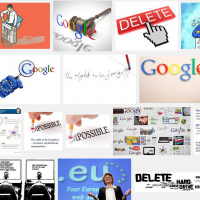The recent verdict by the European Court of Justice is on a lot of people’s minds. Suppose that Google would show incorrect or irrelevant information when someone searches your name; in that case, this verdict lets you file a request with Google not to show the irrelevant pages — but only if the search string actually contains your name. So the pages stay online and can still be found with other search terms.
For the Spanish man who sued Google because he was still being haunted in Google’s search results by an article from 1998, which described his house forcibly being sold by debt collectors, the ‘right to be forgotten’ was a welcome solution. The 16 year old report hindered him in starting a new life for himself, personally and economically. Fortunately for him, that no longer shows up when you search his name. His story is a perfect example: the information being shown was clearly no longer relevant and very harmful to him.
Now that using search engines has become commonplace and the amount of information on the internet increases by 50 to 100 percent every year, more and more individuals will end up being ‘haunted’ by irrelevant search results. It’s not surprising that Google received 250,000 removal requests from 70,000 people in fifty days. That sounds like a large number, but in the same time span Google received 42,324,954 intellectual property rights-based requests to have pages removed from their index — those pages would then be impossible to find in any way.
Nevertheless, the right to be forgotten is being applied very reasonably. We know this because Google sends an email to the owner of every page that is selectively being forgotten. Because of this, we know that a former lawyer requested to have a news article on nu.nl, in which she talked about her burnout four years ago, no longer show up for her name. Google also processed a request about an article in the Dutch newspaper NRC Handelsblad about a basketball player who went missing in 2006. It’s been 8 years now since he was found again, but in his search results he was still shown as missing all this time. Google also granted a request by someone who left a comment on a BBC article, which came up when people googled his name. Each of them reasonable situations with people who want to be rid of irrelevant information and regain control of their own lives.
But can we expect Google to make the right choice in every single case, with such a thin line between relevant and irrelevant, privacy and censorship? And is this right to be forgotten an improvement of the right to privacy, or a deterioration of the right to freedom of speech and free access to information? And how should it be supervised?
Instead of having a debate about the fundamental questions of the digital age, opponents reply with much fervour and little nuance: Wikipedia founder Jimmy Wales called the verdict ‘censorship’, and the British journalist James Ball warns us that there are similarities with the Chinese internet, which is strictly regulated by the state. One article after another appeared in mostly American and British media, ridiculing the right to be forgotten: Google was supposedly making websites impossible to find or even deleting them, and the internet would be turning into ‘fiction’.
As understandable as critics’ discomfort with the Court’s verdict and the new Google policy is, when faced with new challenges of the digital world we need to be careful to keep having the right debate, and not treat the situation with ridicule, but look for answers in a constructive way. Because the debate that these vocal critics have ended up having — Google removes blogs and new articles and that’s censorship — doesn’t have anything to do any more with what we should really be talking about: how can we maintain personal privacy and safeguard the right to have it, in a world that remembers more and more and forgets less and less, with more and more true and false data and algorithms that can make or break people on a scale never seen before? What rights and obligations do data brokers and algorithm dealers like Google have in that world? And is this right to be forgotten an improvement of the right to privacy, or a deterioration of the right to freedom of speech and free access to information?
Children born today will face 80 years of digital history on average by the time their lives are ending. We owe it to future generations to have a proper debate about the enormous amounts of digital (private) information that pile up in proportions never seen before, and not avoid that debate by ridiculing the subject. Until then, Google should decline requests when in doubt, so more people will take it to court and the judges can do their job: deciding which requests should be granted and which ones shouldn’t.
This article has been published in NRC Handelsblad and nrc.next.

Leave a Reply